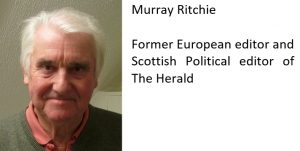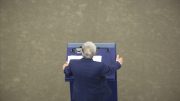Murray Ritchie suggests not. Here he lists the reasons why Brussels is now free to take sides in Britain’s domestic politics – and how Scotland’s European aspirations could benefit.
When it comes to the internal affairs of its member states the European Union has an iron rule of silence. The most recent reminder of this long-standing and not always popular policy of non-interference is the refusal of Brussels to comment on the independence campaign in Catalonia.
Despite an outcry throughout most of the democratic world at the savagery of the sentences handed down by Spain’s judges to secessionist (and peaceful leaders) the EU defiantly remained dumb.
This policy is unlikely to change, much to the disappointment of many Catalans. But as from February 1 it will very probably be a different story regarding the United Kingdom which will have left the EU. No longer will Brussels be required to hide behind its policy of reticence.
Expect leaders in Brussels to feel free to comment on the UK government’s attitude towards Scotland where independence supporters – mostly in favour of rejoining the EU one day – eagerly anticipate political encouragement for their cause.
Scotland voted to remain by a 62 per cent majority but is being yanked out of the club by majority English and Welsh votes and a government in London which Scotland voted against (again)
When the European Commission was preparing to close its presence after 44 years in Edinburgh it issued a statement praising the “incredible role” Scots had played in shaping the EU. “For the time being Scotland’s EU journey is coming to an end,” it said. “For the future, who knows?”
For independence campaigners the signs are propitious. Many signals have come out of the EU since Scotland voted to remain by a 62 per cent majority but is being yanked out of the club by majority English and Welsh votes and a government in London which Scotland voted against (again).
Shortly after the referendum an SNP Member of the European Parliament, Alyn Smith (now in the House of Commons) gave an emotional address in the Strasbourg chamber demanding that the European Parliament should “not forget Scotland,” and the Scots’ democratically expressed resistance to Brexit. He was rewarded with a standing ovation.
Since then the EU has come under severe criticism for doing nothing to help member states’ restless devolved nations and regions. Echoes of the Catalans’ unhappy experience have been heard across the EU not just in Scotland but some areas of Spain, France and Italy.
Belgium has given refuge to a Catalan politician in danger of a long prison sentence for his part in the campaign for independence. In Scotland a Catalan independista has been accorded almost hero status for resisting demands to return to Spain’s idea of justice. And all the while the EU remains schtum, refusing to get involved because of Spanish sensitivity.
For too long it had been assumed Spain would veto any application from an independent Scotland for EU membership for fear of encouraging dissident Catalans but that threat seemed to disappear with government changes in Madrid. Spain’s separatist paranoia might have been softened by the Gibraltar issue. Scotland would be unlikely to take such a stubborn stance against Gibraltar’s return to Spain as politicians in London.
But Spain’s touchiness has not disappeared completely as Miguel Ángel Vecino Quintana, the Spanish consul in Edinburgh, can testify. He was sacked for saying Madrid would not oppose the accession of an independent Scotland. It was permissible for politicians to say such things, it appears, but not paid officials. The unfortunate Quintana was punished, it appears, for telling the truth.
One of the EU’s most outspoken supporters of Scotland rejoining is Elmar Brok, recently retired German Christian Democrat father of the European Parliament, who has long suggested Scotland’s return to the EU fold would be less than complicated.
He foresaw an indyref2 carried out under UK rules and remarked: “It would then be easy to have membership negotiations because Scotland fulfils all the needs for membership. All the standards are already there.”
And Lord Kerr, former UK permanent representative in Brussels, probably Britain’s most informed Remain voice, who wrote Article 50, is on record saying: “The good news is that it would be a very swift accession negotiation. The sort of rubbish people talk about – back of the queue, behind the Turks – there is no queue. People who are declared eligible to join can join as soon as they’re ready to accept the whole of the acquis. Since the Scots would, presumably … still be applying something very close to the existing acquis, they’d be in very fast.”
Guy Verhofstadt, former Belgian prime minister and prominent MEP, agrees. “If Scotland decides to leave the UK, to be an independent state, and they decide to be part of the EU, I think there is no big obstacle to do that,” he has said suggesting it would be suicidal for the EU to refuse entry to people who were sympathetic to the bloc’s aims.
Expect leaders in Brussels to feel free to comment on the UK government’s attitude towards Scotland where independence supporters – mostly in favour of rejoining the EU one day – eagerly anticipate political encouragement for their cause
But if the Brussels mood is welcoming for Scotland’s European aspirations, the same cannot be said of London’s. The UK’s refusal to countenance the Scottish government’s wish for a second independence referendum remains implacable.
Boris Johnson, Britain’s Brexit-obsessed prime minister, has made clear he will not agree any time soon to indyref2. He could be making a mistake.
If after a year or two Brexit proves the disaster many predict then Scotland could be further motivated to leave the UK and rejoin the EU. Polls suggest a bad Brexit is good for the independence cause.
With opinion on independence currently split roughly 50-50 in Scotland the signs are the crunch is coming, probably next year. Most observers of the Scottish scene believe Johnson can hold out for now but not beyond next year’s Holyrood elections when an SNP victory would make indyref2 no longer avoidable.
The last thing Johnson needs now as he prepares to campaign for the preservation of the British Union is the pesky European Union happily going public in its support for a separate Scotland’s return to the fold.

Featured Image Credit: Ulmus Media/Shutterstock.com




